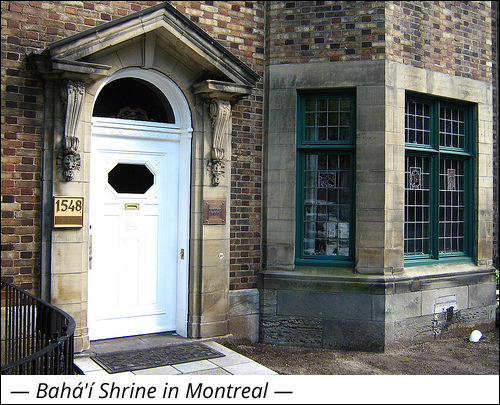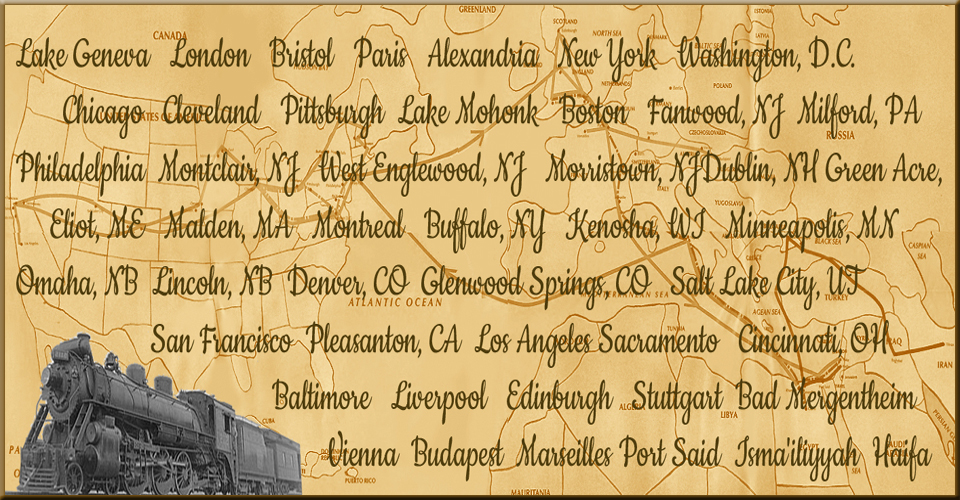|
 Episode 8
October
17, 2021
Episode 8
October
17, 2021
The Gathering Storm
I find these two great American nations highly capable
and advanced
in all that appertains to progress and civilization. […] Therefore, it
is my hope that these revered nations may become prominent factors in
the establishment of international peace and the oneness of the world
of humanity; that they may lay the foundations of equality and
spiritual brotherhood among mankind; that they may manifest the highest
virtues of the human world, revere the divine lights of the Prophets of
God and establish the reality of unity so necessary today in the
affairs of nations.
— ‘Abdu’l-Bahá

Upon arriving in Montreal on 30 August 1912 and finding all doors open
contrary to what He had been told, the Master spent the following nine
days in a whirlwind of activity, ever dogged by fascinated journalists
and interested parties from many religions and associations as well as
many well-known and lesser-known people eager to meet the venerable and
wise ‘Abdu’l-Bahá. And of course, there was always the poor whom He
would visit and shower with generosity and love.
Welcomed into their home by William Sutherland Maxwell and his wife,
May Maxwell, founder of the Montreal Bahá’í community, and two-year old
daughter Mary, it was not long before the crush of people clamouring to
meet with the Master forced Him to take residence at the Windsor Hotel
five days later. Nevertheless, He said the Maxwell home was His own,
eventually becoming the only Bahá’í shrine on North American soil. He
gave talks at various halls and two mighty churches – always filled to
capacity and beyond – both enthralling the captive audience with the
beautiful uniting teachings of His Father, Bahá’u’lláh, but also
warning of a world war to come.
On September 9, the Master left Canada for the 14-hour trip to Buffalo,
stopping briefly in Brockville, Ontario along the way. A four-year old
Mohawk boy, Jim Loft, liked to watch the trains fly past and on that
fateful afternoon he was sitting on the fence overlooking the tracks
from a distance when the grumbling earth announced the approaching
train. Jim suddenly saw a man in long flowing white robes waving at him
from a window and was so astonished that he fell off the fence. He
later became a devoted Bahá’í, the brief but powerful vision of seeing
the Master stamped on his heart and soul for the rest of his life.

Upon ‘Abdu’l-Bahá’s return
to the U.S, although exhausted by His travels and talks, He set out for
California with stops in Illinois, Minnesota, Nebraska and Colorado
before arriving in San Francisco on October 1, and when He returned
east the Master stopped in Ohio and Washington DC, and then on to New
York, where He boarded the SS Celtic for Europe on December 5, 1912. In
almost eight months
of incessant and exhausting travel and many talks that would have
felled an ordinary man, the Master had by then visited 15 states and
two provinces which included 50 localities where He gave over 400
talks,185 of which were recorded for posterity.
After a brief period spent in Britain, Scotland and France,
‘Abdu’l-Bahá set out for an eight-day trip to Germany in April 1913,
visiting Stuttgart, Esslingen, Bad Mergentheim. The Master found that
the German Bahá’ís were “endued with perceptive eyes and attentive
ears," and were "attracted to the principles of the oneness of
mankind.” He predicted that Germany will "surpass all other regions"
and "lead all the nations and peoples of Europe spiritually."
But He also spoke of the impending war that would one day engulf the
centre of Europe. Even so, despite the crucible of suffering to come
and however difficult, in His eyes there were always opportunities to
grow spiritually:
The
more difficulties one sees in the world, the more
perfect one becomes. The more you plough and dig the ground, the more
fertile it becomes. The more you cut the branches of a tree, the higher
and stronger it grows. The more you put the gold in the fire, the purer
it becomes. The more you sharpen the steel by grinding, the better it
cuts. Therefore, the more sorrows one sees, the more perfect one
becomes.
The Master made a short visit to Vienna, Austria, where among a throng
of people, He met with Bertha von Suttner, a peace advocate who was the
first woman to win the Nobel Peace Prize and the second woman to win a
Nobel Prize after Marie Curie.
He was especially pleased to visit Hungary, arriving in Budapest on
April 9, 1913. “I am happy to have been able to visit Hungary," He
said, "because this is the country where the culture of the West and
the warm hospitality of the East meet and merge into one." There He met
renowned Orientalist Arminius Vambéry, who was overcome by His
presence, stating “I have seen the father of your Excellency from afar.
I have realized the self-sacrifice and noble courage of his son, and I
am lost in admiration.”
‘Abdu’l-Bahá’s time in Europe was swiftly drawing to a close and not a
moment too soon. His fragile state of health threatened to completely
overwhelm Him, and as He made His way back to Egypt, the starting point
of His astonishing journey to herald Bahá’u’lláh’s world-encompassing
message of peace and justice, the 69-year-old former prisoner was
preparing for a very well-earned rest. However, dark clouds were
amassing over both the Master and the world.
|
|
